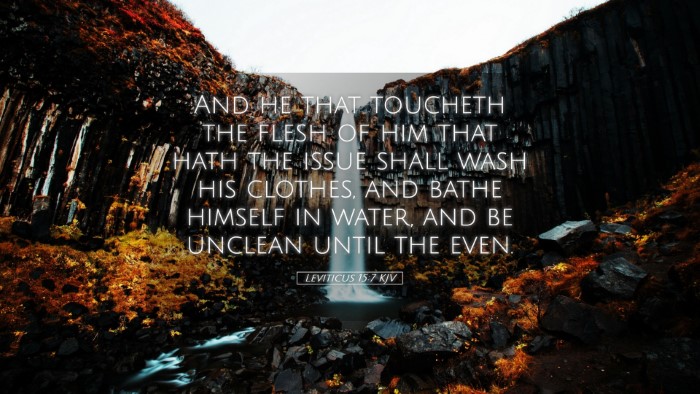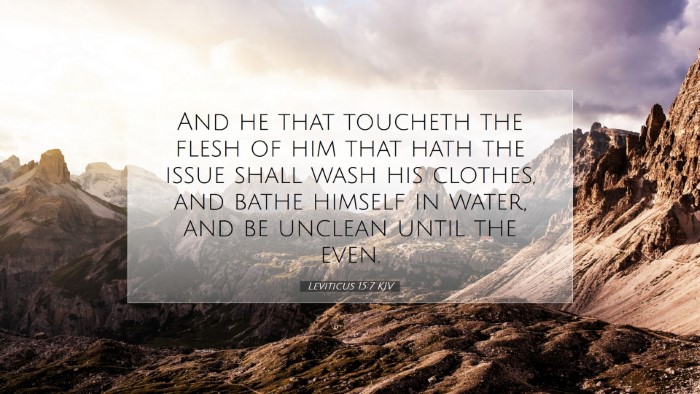Commentary on Leviticus 15:7
Leviticus 15:7 states, "And he that touches the flesh of him that hath the issue shall wash his clothes, and bathe himself in water, and be unclean until the even." This verse is part of the larger context concerning the laws of cleanliness and uncleanliness related to bodily discharges, which ties into the themes of holiness and separation in the Mosaic Law.
General Context
The book of Leviticus revolves around the theme of holiness and the standard that God expects from His people. It provides detailed regulations that govern the life of the Israelites in relation to worship, purity, and moral living. In chapters 15, particular focus is given to issues pertaining to bodily discharges, with an emphasis on maintaining purity and understanding the implications of physical contact with unclean individuals.
Theological Significance
This verse emphasizes the importance of ritual purity. The idea that touching the flesh of someone who is unclean renders an individual unclean as well underscores a significant theological principle: spiritual and physical holiness are interconnected. The community's health—both physical and spiritual—depends on adherence to these purity laws. Here are some insights based on notable public domain commentaries:
-
Matthew Henry: Henry notes that this law was given to reinforce the understanding of contagion in a spiritual sense. Just as physical diseases can spread, so too can spiritual uncleanness. He emphasizes that believers must be cautious about whom they associate with, as one can easily become contaminated by the sins or impurities of others.
-
Albert Barnes: Barnes highlights that these laws were part of the ceremonial system designed to set Israel apart from other nations. He articulates that the fear of contamination from uncleanliness served to remind the people of God’s holiness and the care they must take in order to live pleasing unto Him. This law served as a microcosm of the larger call to holiness within the community.
-
Adam Clarke: Clarke elaborates on the nature of ceremonial uncleanliness and its implications. He points out that while the physical act of washing symbolizes purification, it reflects a deeper truth about the ongoing need for spiritual cleansing. To touch the unclean was not only a physical act but also represented a spiritual reality—highlighting the continual struggle believers face in maintaining a pure heart before God.
Practical Application
For pastors and theologians, this verse presents several important lessons for contemporary Christian practice:
-
The Call to Holiness: The emphasis on purity calls believers to a higher standard of living that is reflective of God's holiness. As believers are called to be salt and light in the world, this verse serves as a reminder that engaging with a fallen world must be approached with caution and discernment.
-
Understanding Grace: While the law speaks to the necessity of ritual purity, it also prepares the way for understanding the grace found in Christ, who fulfills the law. Understanding these purification laws can enhance one’s appreciation for the redemptive work of Jesus and the call to live in the Spirit, which empowers believers to overcome the struggles with sin and impurity.
-
Community Dynamics: This verse can illuminate discussions about community dynamics in the church. Just as physical impurities affected communal purity, so too do spiritual issues within a church community. Pastors should encourage confession, accountability, and the pursuit of holiness in community settings.
Cultural Implications
In ancient Israel, these purity laws were crucial for maintaining social order and spiritual health within the community. The act of washing and being unclean until evening not only had physical implications but also social and relational aspects, as it required individuals to navigate personal and communal boundaries carefully. Understanding these cultural implications can provide rich insights into how communities of faith today can uphold standards of purity and accountability without compromising grace and love.
Conclusion
Leviticus 15:7, while seemingly straightforward in terms of its requirements for ritual cleanliness, offers profound insights into the nature of holiness, the impact of sin, and the call for believers to be vigilant in their pursuit of righteousness. As scholars, pastors, and students of the Word reflect on this passage, it is imperative to consider both its historical context and its implications for contemporary faith practice.


